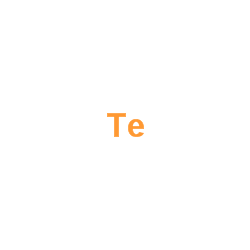Tellurium

Tellurium structure
|
Common Name | Tellurium | ||
|---|---|---|---|---|
| CAS Number | 13494-80-9 | Molecular Weight | 127.600 | |
| Density | 6.25 | Boiling Point | 900 ºC | |
| Molecular Formula | Te | Melting Point | 500 ºC | |
| MSDS | Chinese USA | Flash Point | N/A | |
| Symbol |


GHS07, GHS08 |
Signal Word | Danger | |
|
L-cysteine-capped core/shell/shell quantum dot-graphene oxide nanocomposite fluorescence probe for polycyclic aromatic hydrocarbon detection.
Talanta 146 , 780-8, (2015) Environmental pollutants, such as the polycyclic aromatic hydrocarbons (PAHs), become widely distributed in the environment after emission from a range of sources, and they have potential biological effects, including toxicity and carcinogenity. In this work,... |
|
|
Synthesis and characterization of fluorescence resonance energy transfer-based nanoprobes by coating CdTe QDs with rhodamine B in gelatin nanoparticles.
J. Nanosci. Nanotechnol. 13(6) , 4330-3, (2013) A FRET-based nanoprobe consisting of CdTe quantum dot as donor and rhodamine B as acceptor embedded in gelatin nanoparticles was constructed and the photophysics of the system was characterized. The FRET-based sensors were led to at fixed donor/acceptor dista... |
|
|
A rapid and sensitive assay for determination of doxycycline using thioglycolic acid-capped cadmium telluride quantum dots.
Spectrochim. Acta. A. Mol. Biomol. Spectrosc. 152 , 119-25, (2015) A rapid, simple and inexpensive spectrofluorimetric sensor for determination of doxycycline based on its interaction with thioglycolic acid-capped cadmium telluride quantum dots (TGA/CdTe QDs) has been developed. Under the optimum experimental conditions, the... |
|
|
Immobilization of Distinctly Capped CdTe Quantum Dots onto Porous Aminated Solid Supports.
ChemPhysChem 16 , 1880-8, (2015) Immobilization of quantum dots (QDs) onto solid supports could improve their applicability in the development of sensing platforms and solid-phase reactors by allowing the implementation of reusable surfaces and the execution of repetitive procedures. As the ... |
|
|
Amplified solid-state electrochemiluminescence detection of cholesterol in near-infrared range based on CdTe quantum dots decorated multiwalled carbon nanotubes@reduced graphene oxide nanoribbons.
Biosens. Bioelectron. 73 , 221-7, (2015) An amplified solid-state electrochemiluminescence (ECL) biosensor for detection of cholesterol in near-infrared (NIR) range was constructed based on CdTe quantum dots (QDs) decorated multiwalled carbon nanotubes@reduced graphene nanoribbons (CdTe-MWCNTs@rGONR... |
|
|
Synthesis of highly luminescent and biocompatible CdTe/CdS/ZnS quantum dots using microwave irradiation: a comparative study of different ligands.
Luminescence 29(7) , 837-45, (2014) We compared the effects of several ligands frequently used in aqueous synthesis, including L-cysteine, L-cysteine hydrochloride, N-acetyl-L-cysteine (NAC), glutathione and 3-mercaptopropionic acid, for microwave synthesis of CdTe quantum dots (QDs) in a seale... |
|
|
Manganese modified CdTe/CdS quantum dots as an immunoassay biosensor for the detection of Golgi protein-73.
J. Pharm. Biomed. Anal. 117 , 18-25, (2015) In this paper, a new fluorescence bioassay for Golgi protein-73 (GP73), a promising marker for monitoring liver tumor, was developed by using anti-GP73 antibody (GP73 Ab) capped quantum dots (QDs) coupled with protein A/G agarose beads in an attempt to improv... |
|
|
Quantum dots-based label-free fluorescence sensor for sensitive and non-enzymatic detection of caffeic acid.
Talanta 141 , 182-7, (2015) We have developed a label-free fluorescence sensor for caffeic acid (CA) by the use of CdTe:Zn(2+) quantum dots (CdTe:Zn(2+) QDs) as an output signal. The principle of sensor is based on the fluorescence quenching and binding properties of Fe(2+) toward QDs a... |
|
|
Nanostructure synthesis at the solid-water interface: spontaneous assembly and chemical transformations of tellurium nanorods.
ChemPhysChem 15(14) , 3026-31, (2014) Bottom-up synthesis offers novel routes to obtain nanostructures for nanotechnology applications. Most self-assembly processes are carried out in three dimensions (i.e. solutions); however, the large majority of nanostructure-based devices function in two dim... |
|
|
Preparation of graphene quantum dots based core-satellite hybrid spheres and their use as the ratiometric fluorescence probe for visual determination of mercury(II) ions.
Anal. Chim. Acta 888 , 173-81, (2015) We herein proposed a simple and effective strategy for preparing graphene quantum dots (GQDs)-based core-satellite hybrid spheres and further explored the feasibility of using such spheres as the ratiometric fluorescence probe for the visual determination of ... |